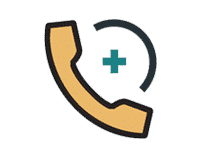Medically Monitored Detox at Sana Lake
Medically Monitored Detox is the first step in the recovery process from drug or alcohol addiction. For some substances, withdrawal symptoms associated with detox can be severe. This is what makes detoxification necessary to keep the individual safe and comfortable.
Sana Lake Recovery Center provides its members with a comprehensive treatment plan that starts with a medically monitored detox. We provide a wide range of programs and services for our member’s assistance. Our team of compassionate medical professionals helps people:
- Safely clear their body from unwanted and harmful substances
- Manage acute withdrawal symptoms
- Offer ongoing substance disorder treatment for individuals who have opted for detoxification
The best medical care often depends on the type of substances an individual has been using and their current physical dependence level. The effect of addiction on a person’s mental health can be an influential factor. Discovering the right recovery facility is important, especially in Kansas City.
What Does Medical Detox Mean in Medicine?
 Generally, detox or detoxification refers to a process in which toxins are removed from the human body. Detox services are a common staple of many rehab facilities. In the case of addiction treatment, the term “detoxification” refers to the specific period that the human body is given to metabolize and process any substances in the system.
Generally, detox or detoxification refers to a process in which toxins are removed from the human body. Detox services are a common staple of many rehab facilities. In the case of addiction treatment, the term “detoxification” refers to the specific period that the human body is given to metabolize and process any substances in the system.
The process aims to remove the toxic influence on those who are struggling with the misuse of substances. These services help usher you into the next phase of the continuum of care.
Here at Sana Lake in Missouri, we take pride in our virtual addiction treatment process and personalized approach that employs several licensed physicians and team members with different areas of expertise. Our medical staff of doctors, psychiatrists, and nurse practitioners will ensure a medically safe and comfortable environment for detoxing. Additionally, they will put focus on general physical and mental health to ensure the well-rounded health of each member.
Medical detoxification alone is not always enough to overcome addiction. It’s only the first stage. Members should attend an inpatient or outpatient program once detoxification is complete. Counseling is a common feature to combat drug abuse. These services can grant you the opportunity to better understand your addiction and any psychiatric conditions you may be facing.
This effect can push you to search for a deeper understanding of the role your perspective attaches to substance abuse. Education about addiction can be an invaluable resource.
At Sana Lake, we offer a detoxification plan to help members boost their recovery. Medical detoxification also prevents relapses in the future. Our highly effective treatment follows three steps:
- Evaluation – To screen a member’s mental and physical health issues through blood tests and psychiatric history. The data is processed to determine the best outcomes.
- Stabilization – Doctors offer psychological and medical therapies to stabilize the individual.
- Preparation for Entering Addiction Treatment– Doctors familiarize the individuals with the process and inpatient treatment programs.
Why is Medical Detox Necessary?
 When a person is physically dependent on drug use, then they should be considering a medical detox center. Physical dependence is highly likely if you display any of the following behaviors:
When a person is physically dependent on drug use, then they should be considering a medical detox center. Physical dependence is highly likely if you display any of the following behaviors:
- Suffer from regular drug cravings
- An extended period of drug use
- Misuse large quantities of the substance at a time
- Consistent increase in the number of substances to achieve the same effects
- Misusing at inappropriate times (like at work)
- Difficulty quitting “cold turkey,” alone or without help
Each addictive substance has a distinctive set of withdrawal symptoms that are caused by the chemical effects in the body when someone limits using the substance or stops taking it altogether. This can be dangerously severe. Medical drug detox can offset these symptoms through prescribed medications. The medical team will also monitor the individual to make sure the detoxification process is working as expected. Medical detox is a 24/7 monitored process.
Education plays a significant role in the medical facility. If a person can connect to the tools used to break down their substance use disorders, they can begin to truly integrate the practices of recovery. For example, triggers are a formidable force but can be managed by the availability of proper understanding. Education on addiction introduces recovering adults and adolescents to all the necessary alternatives to their growth.
Additionally, adult men and adult women experience the effects of substance use disorders differently. Adult men are more likely to abuse due to stress and how their bodies build a higher tolerance. They are also more likely to die from addiction compared to women. Adult men account for a large portion of the addiction trends.
Consequently, adult women tend to struggle with substance abuse in smaller amounts but may experience more physical effects. Adult women are more likely to go to the emergency room or overdose. Adult women who are victims of domestic violence are at an increased risk of addiction. Luckily, there are rehab facilities that highlight these differences and offer services dedicated to these nuances. Contact your facility to determine which treatment plans would be best for you.
Medically Supervised Detox in Missouri: Will My Insurance Cover Me?
 Sane Lake Recovery Center is glad to collaborate with you in assisting your patients, clients, employees, and their families in recovering from substance use and mental health disorders, regardless of whether you are a clinician, professional, or employer.
Sane Lake Recovery Center is glad to collaborate with you in assisting your patients, clients, employees, and their families in recovering from substance use and mental health disorders, regardless of whether you are a clinician, professional, or employer.
In most cases, insurance coverage applies to medical detox and even mental health services. Payment assistance can offer services to those of all ages to gain access to care. With the Affordable Care Act of 2010, benefits were expanded to addiction treatment programs as a line of much-needed support.
Your treatment plan will be decided upon by our knowledgeable, caring staff, the majority of whom have personal experience, and they will give you all the resources you require to achieve long-term success. We accept the following types of insurance:
- UnitedHealthcare
- Mercy
- HealthLink
- UMR
- United Behavioral Health
- WellFirst Health
- BlueCross BlueShield
- CoreSource
- Cigna
- Tricare
- Kansas City
- Optum
Contact our admissions specialists, and we’ll assess your needs to start creating your individualized treatment plan.
What Addiction Requires Medical Detox in Kansas City and St. Louis?

- Alcohol
- Amphetamines
- Benzodiazepines
- Heroin
- Opioids
Suffering from an addiction to any of these substances will require our medical team to perform a thorough evaluation before submitting medical detox and addiction treatment recommendations. These substances often create deadly withdrawal symptoms in those suffering from substance use disorder.
Medication-assisted treatment (or MAT) is the method used to address these physiological changes. Medication-assisted treatment can be considered a form of harm reduction for someone with an addiction.
Detox is a preparatory step for treating alcoholism. Alcohol addiction attributes to 1,913 annual deaths in the state of Missouri. This form of addiction also accounts for 78.6% of deaths among those 35 years old or older.
During this phase, medical professionals completely flush out toxins from the body. The withdrawal symptoms of this phase typically subside within two weeks once the treatment starts.
However, treatment approaches may vary from member to member depending on AUD‘s (alcohol use disorder) severity. At Sana Lake Recovery Center in Kansas City, we offer a range of recovery processes that includes counseling sessions, support options, therapies, and activities.
During this phase, members may go through several types of withdrawals that may involve life-threatening or mildly intense discomfort. Plus, the seriousness and longevity of AUD play an important role in the way members may experience discomfort. Some of the common negative effects are:
- Insomnia
- Anxiety
- Headaches
- Nausea
- Sweating
Amphetamine is a powerful stimulant that has a high potential for people who struggle with addiction. Prolonged use of this stimulant may result in chemical and psychological dependence on this drug. Amphetamines can be legally prescribed for the treatment of narcolepsy and Attention Deficit Hyperactivity Disorder (ADHD).
Once amphetamine addiction takes over, struggling individuals may find it hard to cut back on it and face various withdrawal symptoms. It occurs when an individual becomes accustomed to amphetamine presence and is unable to perform routine tasks normally. The nervous system re-calibrates and struggles to regain its chemical balance.
Amphetamine Withdrawal Symptoms
Following are the physical and emotional withdrawal symptoms of amphetamine addiction:
- Difficulty breathing
- Tremors
- Headaches
- Oversleeping
- Excessive sweating
- Blurry vision
- Strong cravings
- Paranoia
- Mood swings
- Loss of concentration
Benzodiazepines are habit-forming prescription medications that medical professionals prescribe to treat numerous stressed-related conditions that including insomnia, epilepsy, and anxiety disorder. Thus, benzo use can lead to addiction if the member doesn’t use them properly. Following are some of the common benzodiazepines:
- Ativan (lorazepam)
- Xanax (alprazolam)
- Valium (diazepam)
- Klonopin (clonazepam)
Even if you take this drug for a short period, it may lead to dependence and tolerance. When you stop taking the drug, you may suffer from benzo withdrawals as your brain attempts to regain its natural balance. Meanwhile, going through the following withdrawal symptoms is common.
- Restlessness
- Aching muscles
- Irritability
- Anxiety
- Blurred vision
- Sweating
- Trouble concentrating
Being a morphine derivative, this is an opioid drug that is manufactured illicitly. The drug has both pleasurable and pain-relieving properties as it interacts with opioid receptors in the brain. The drug is powerful enough to make the body and brain depend on it. Addiction happens very quickly and only after using a few times.
Withdrawal Symptoms
Once those who are struggling with the misuse of heroin stop taking the drug, they will experience uncomfortable withdrawals. The severity depends on a variety of factors, like frequency of intake and potency, and the average amount is taken regularly. Withdrawal symptoms may include:
- Agitation
- Aching muscles
- Anxiety
- Diarrhea
- Nausea
- Abdominal cramping
Morphine and other prescribed painkillers, which include Vicodin, OxyContin, and Fentanyl are all opioids. Overconsumption of these substances leads to addiction and lethal chemical dependency. It is difficult to quit opiates as they reduce pain and produce euphoric feelings.
When someone takes opiates for a long time, their body develops tolerance. That means the person requires a higher dosage every time they use it to relieve pain. Opioid withdrawal may cause the following:
- Vomiting
- Sweating
- Insomnia
- Dilated pupils
- Diarrhea
- Tremors or convulsions
What Medications are Used During Medical Detox?
- Methadone
- Naltrexone
- Antidepressants
- Anticonvulsants
- Buprenorphine
- Suboxone
- Antipsychotics
- Anti-nausea medications
Methadone treats opioid withdrawal and has been used to do so since the 1950s. It’s considered a staple in drug addiction treatment, even though it is an opioid itself. Methadone is much milder than most other prescription opioid medications and is used to taper members off of stronger opioids. When used as part of medically supervised detox, methadone is very effective.
Treatment professionals use Naltrexone for both the treatment of opioid and alcohol use issues. This blocks the effect of opioid receptors and decreases the urge to use alcohol or opioids. For this reason, it can cause discomfort in someone who has recently used opioids. Due to this interaction, a member must be abstinent from opioids for seven days.
Antidepressants are a class of medications that can help relieve depression, social anxiety, and other disorders. They aim to correct chemical balances in the brain through neurotransmitters responsible for changes in mood or behavior change. Some examples of antidepressants include Celexa, Lexapro, Prozac, Paxil, and Zoloft. Antidepressants are commonly used in amphetamine detox as well as alcohol detox.
Several anticonvulsant drugs can help manage side effects during medical detox. One example is Depakote, which interferes with the brain’s ability for seizure activity and prevents convulsions by controlling nerve cells from transmitting electric signals too quickly. It also helps regulate mood swings as some people seem less anxious than before. These can be used during benzo, amphetamine, opioid, and alcohol detox.
Buprenorphine is safe for long-term use and can help people experiencing physical dependence on opioids, such as reducing side effects or cravings. It also helps with the risk of overdose because it reduces that person’s desire for euphoria-inducing drugs like opioids while still providing pain relief when needed.
Buprenorphine itself is approved by the FDA specifically so individuals do not need a prescription. Buprenorphine can alleviate any negative side effects during the detoxification process. When entering addiction treatment it can be provided as part of a medication-assisted treatment program.
Suboxone is a medication used in the treatment of opioid addiction. It’s available as both an oral tablet and film that you place under your tongue or inside the cheek. Suboxone contains buprenorphine combined with naloxone- two drugs that help lessen withdrawal symptoms from opioids such as oxycodone and Percocet.
Antipsychotic medications can be a great option for members in detox who have certain co-occurring or psychiatric issues. These drugs are prescribed by doctors to help them to alleviate side effects such as delusions, hallucinations, paranoia, and hearing voices that often come with schizophrenia, bipolar disorder, or dementia. These medications can also help treat anxiety and extreme agitation in members.
Doctors and nurses often prescribe anti-nausea medications as nausea is a common withdrawal symptom associated with detox. Zofran is one such medicine that’s used during detox. Patients experience nausea as their body adjusts from no longer having drugs or alcohol in their system.
At Sana Lake Recovery Center in Kansas City, we offer a complete detox process under the supervision of our mental and medical health professionals. Our clients are primed with quality care and refined details for substance abuse treatment.
Members remain under the observation of medical professionals which increases their comfort level and safety when they undergo potential medical complications and painful symptoms that are the result of substance use disorder.
Are You Ready For Medically Monitored Detox at Sana Lake?
 If you are dealing with addiction in Missouri, you may feel like you’re struggling alone. Your recovery journey can be impacted by access to payment assistance and self-doubt. Substance abuse can cloud your judgment and hurt those in your immediate community. It may be hard to even reach your family. Some may not search for rehab services due to the stigma of addiction.
If you are dealing with addiction in Missouri, you may feel like you’re struggling alone. Your recovery journey can be impacted by access to payment assistance and self-doubt. Substance abuse can cloud your judgment and hurt those in your immediate community. It may be hard to even reach your family. Some may not search for rehab services due to the stigma of addiction.
At Sana Lake, we understand how difficult it can be to overcome the disease of addiction. Once your mind and body become dependent on a substance, it feels nearly impossible to live without it. But, you can redevelop your independence through quality care as you continue this journey.
Our dedicated team in Missouri is here to help you reach your goals and push you to feel powered by recovery. You don’t need to go through this alone. You can end addiction in your life. Setting up an appointment for a consultation is simple. Just contact us today to learn how we can help!
Contact Us
Get Help for You or A Loved One





